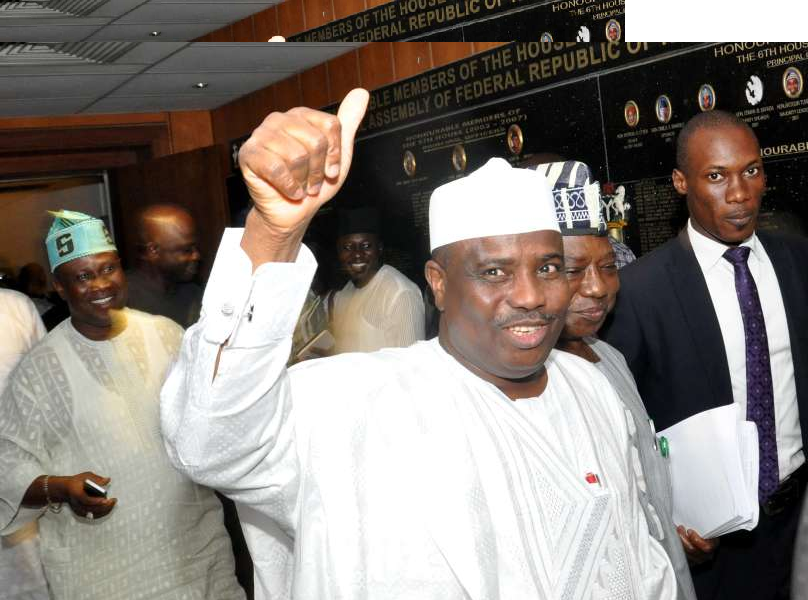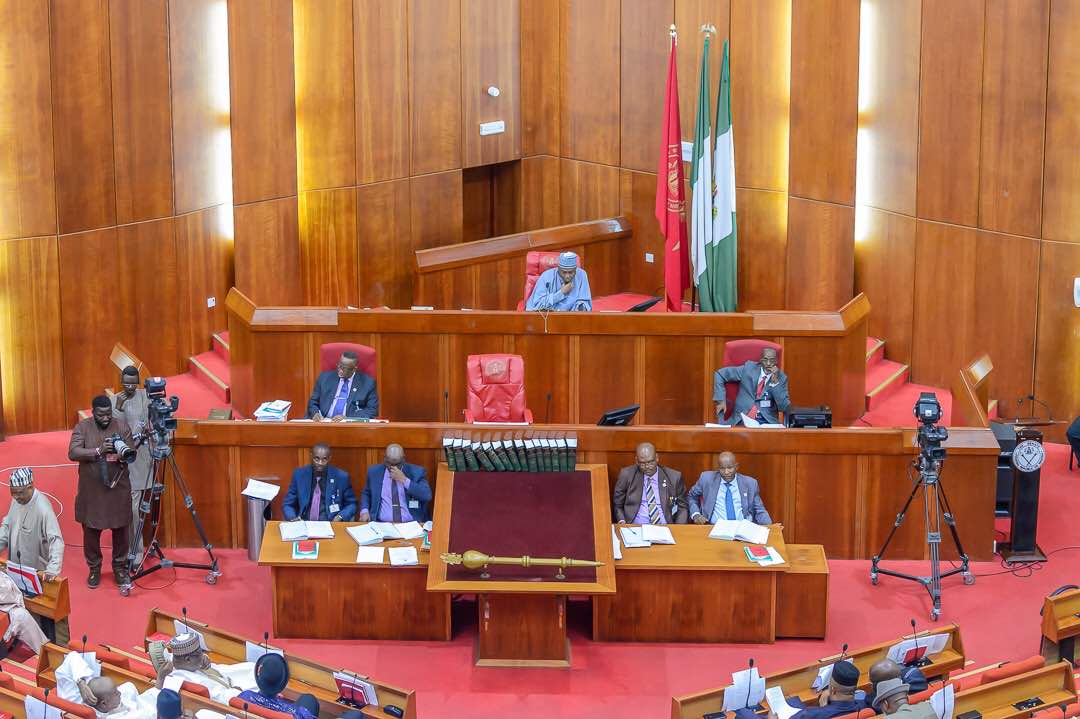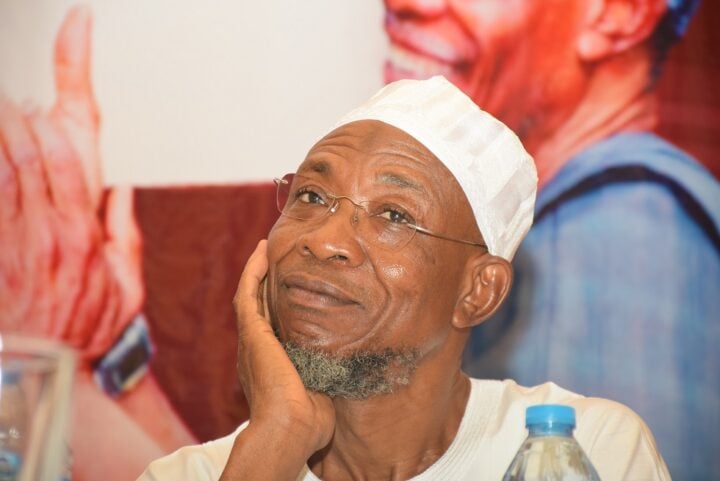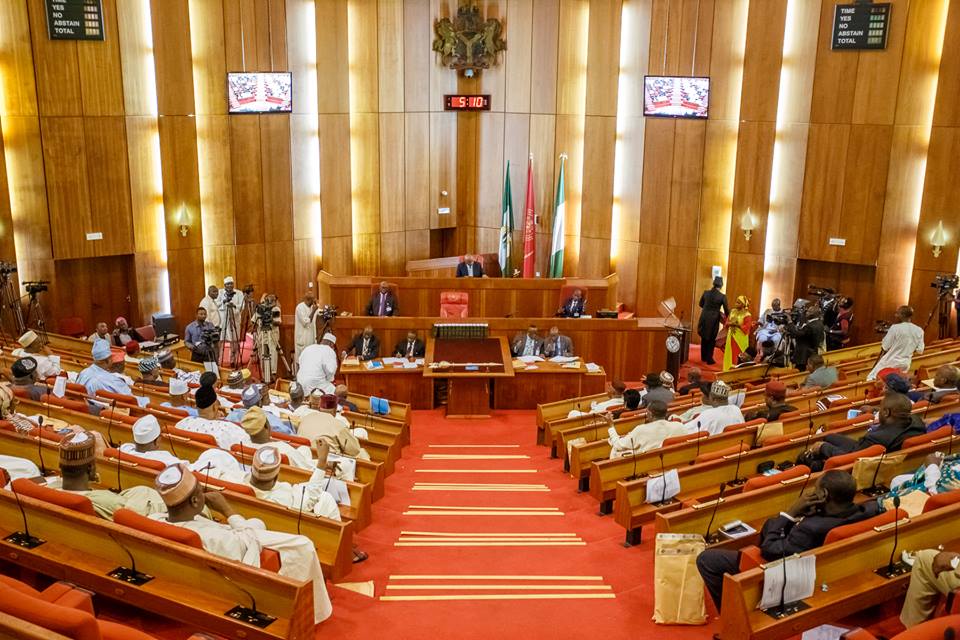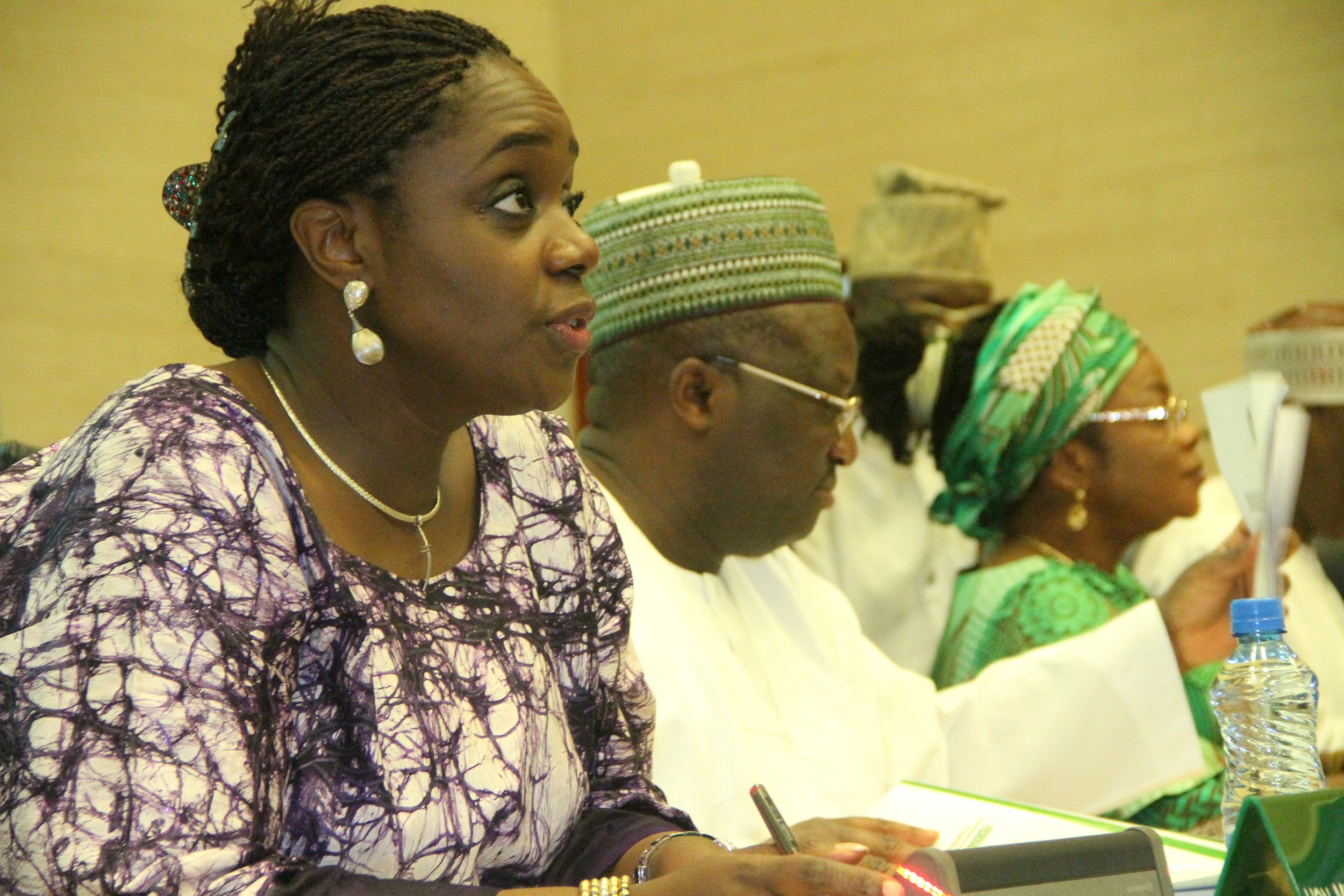BY ANSELM OKOLO
Dateline: June 5, 2011. Location: Presidential Villa, Abuja and Wadata House headquarters of the then ruling Peoples Democratic Party, PDP. A final nod had just been given on what the leadership of PDP, thought was a water tight marshal plan to usher in its anointed candidate, Hon Mulikat Akande from Oyo state as the 12th Speaker of the House of Representatives.
Within the community of elected members of the party to the House of Representatives different thinking was at play. Experience from the 6th House of Representatives had convinced members on the need for a Speaker who can bring candour, knowledge of its rules and regulations and a man with a mind of steel on issues of accountability, autonomy for the Legislature, inclusiveness and pursuit of national goals. Spurred by this pursuit, its choice for a Speaker had fallen on a different person.
It was therefore not surprising that on June 6, 2011, when members of the House assembled to choose their leaders, majority voted for an independent voice that would continue the tradition of a robust legislature that can check the excesses of the Executive branch. Members were also interested in the emergence of a Speaker who would exercise a call to selfless leadership and experience.
Advertisement
And so, like a knight in shining armour Gov Aminu Waziri Tambuwal CFR, then representing Kebbe/Tambuwal federal constituency of Sokoto state, elected under the banner of PDP to his third term as member of the House, rode to victory as the 12th Speaker of the House of Representatives on the crest of that “rebellious vote”.
Remarkable is the fact that majority of members of that House were elected under the banner of the PDP. Reason, history remembers that Speakership election as a watershed in election mobilization and consensus building by a politician in the annals of electioneering in the country.
It was therefore not surprising that the hallmarks of Tambuwal’s leadership as Speaker of the House of Representatives were characterised and guided by the principles of consensus building and team work.
Advertisement
Just in case anyone was in doubt on what he was out to achieve, AWT as he came to be fondly addressed by his colleagues and political admirers gave some insight moments after his overwhelming majority victory (252 to 90) when he said, “my period of service as the Speaker of this hallowed Chamber will restore the House of Representatives as an institution where the will of the people is done”. He had good reasons to aspire to do that.
But first he set out to assemble his team. The biggest challenge was how to get the whole House working as a team from the word go, that is, leaving behind, the scars of the deep divide that trailed the hard fought campaigns and intrigues preceding his election as Speaker. Understandably, the House was by then divided along its sims with two major camps at one another’s jugular.
Reaching deep into his personal attitude of not harbouring hate, anger and animosity against any one especially when the reason for the divergence is pursuit of a call to service, Tambuwal quickly let go of all that happened during the electioneering campaigns. He decided to reach out to his opponent in the election Hon Akande with an olive branch.
Though counselled against it, Tambuwal ensured that Hon Akande was appointed Leader of House, ipso facto making her, the number three person in the hierarchy of the House. That appointment also meant that Tambuwal would have to depend on Akande to move all government sponsored motions and rally support to motions he as Speaker would be spearheading.
Advertisement
The risks of his decision were not unkown to AWT at that time but he convinced his supporters in the Speaker election “the time for elections are over, now is the time to build a united House with one purpose – the good of the people of the country”. Even his foes concede that Tambuwal has an uncommon forgiving heart.
As it turned out eventually, Tambuwal also shared out the chairmanship and deputy chairmanship of Committees positions amongst members of his group and those in the Akande group. That singular show of magnanimity and statesmanship in leadership turned an erstwhile divided House into a cohesive, united and purpose driven Chamber poised and able to achieve within a period of four years, a long list of pioneering and stabilizing achievements for the House and country.
The House of Representatives under Tambuwal was purpose driven, stable and devoid of rancour and wrangling. The leadership crises that rocked the House prior to his election as Speaker simply vanished. Members united under his leadership and philosophy of effective performance and selfless national service. Considering that the House of Representatives is populated by members with equal powers and status, keeping members together, united in pursuit of common goals and aspirations and programmes for a period of 4 years is no mean feat.
If AWT’s decisions on the choice of Leader of the House and appointments of Committee chairmen and deputies demonstrated Tambuwal’s rare manifestation of magnanimity in leadership then his choice of personal aides from all the regions, ethnic groups and religions further showed his perfect understanding of the strength in the diversity available in the country.
Advertisement
Leadership analysts agree that AWT’s disposition to leadership and how it can change society fit into the mould of other great men and women of history around the world who changed their societies and the world at large.
THE LEGISLATIVE AGENDA
Advertisement
Never before was it heard of in the House of Representatives or indeed the National Assembly. With a formidable and involving team in place, Tambuwal set his eyes on establishing a road map for the House. Rather than unveiling a budget of wish list, intents and proposals for attainment over a period of four years, he decided that a Social Contract with the people, on which Nigerians would evaluate the performance of the House was a better deal.
At the inauguration of the Agenda on the very first legislative day after his election, he promised that the House was “committed to honouring the faith and trust reposed in it by the Nigerian people and we are determined to chart a new course of legislative business for the benefit of our people”
Advertisement
In order words, he had through the Legislative Agenda set before Nigerians ahead of the start of actual legislative business, the milestones and attainments for his and the House’s evaluation. Never before then had any legislative leader ventured that far.
On a general prism, the Agenda was ambitious and forward looking, enough to frighten many leaders but not Tambuwal. He was convinced that with a cohesive team, driven by a common purpose – good of the people – nothing was unachievable. For him, “the House of Representatives will pursue an aggressive legislative agenda to reposition itself as a key branch of government able and determined to deliver on the key elements of governance”. Tambuwal delivered on this promise.
Advertisement
First and foremost, that pioneering culture of an Agenda with the people, initiated by AWT, has today become a standard tradition for leadership in the House of Representatives and the Senate.
CONSTITUTION AMENDMENT
This was a major success of Tambuwal under the Legislative Agenda. Cardinal to Tambuwal was the review of the 1999 constitution. This national assignment entrusted to an ad-hoc committee chaired by the Deputy Speaker, Rt Hon Emeka Ihedioha, CON, became a must – do undertaking for Tambuwal in response to the yearnings of Nigerians for a more people centred and democratically engineered constitution. Agitations against the 1999 constitution had festered across the nation as clamour for resource control, restructuring and secession got louder.
It was a bold move by the House of Representatives under Tambuwal and the outcomes were radical as well as revolutionary.
First was in the involvement of Nigerians in the process of the amendment with the Peoples Parliamentary Sessions in all the federal constituencies in the country under the supervision of the member representing the constituency in the House. Nothing like it had ever been done before it in the history of constitution making. Critics had warned Tambuwal the bold move to take the process to the people would boomerang. While the threat was real, Tambuwal was more focused on getting the people involved in the process and in making the document that would come out of it a truly “we the people” one than in worrying about what the critics were saying.
As it turned out, Tambuwal was correct again. The sessions held across the federal constituencies without hitch. It is to his credit that the sessions created a unique opportunity for Nigerians to truly participate in actual constitution making for the first time directly. It was the closest thing to a referendum in constitution ratification ever in the country, as the people were asked to say “Yes” or “No” to various burning and thorny Constitutional issues facing the nation. Nigerians response was truly fascinating!
Eventually, the House of Representatives voted by 2/3rd majority to pass what turned out to be some very radical constitutional amendment measures ever in the annals of Constitution amendment in the country. These include;
The House voted overwhelmingly to give full financial, Administrative, Executive and legislative autonomy to Local Government Councils (LGC) in Nigeria. By this vote, the following was achieved:
(a) It made the LGC, a tier of government in Nigeria.
(b) It denies undemocratically elected LGC’s of any Revenue Allocation from the Federation Account or from the States.
(c) It created a uniform 4-years tenure for Local Government Councils
(d) It created the offices of Chairman and Vice-Chairman of LGC’s including their Qualifications, mode of election, oath of office, method of Removal e.t.c amongst other innovations for the proper administration of LGCs.
The House also voted by 308 for, 22 against and 12 abstentions to amend or alter section 8 of the Constitution by removing, ambiguities in the creation of new states and boundary adjustment.
Section 8 (1)(b) was amended to require a referendum for creation of new states, to be approved by at least two-thirds majority of the registered voters of the Local Government Areas instead of the “people of the area” where the demand originated from which was vague and subject to different interpretations. In addition, Section 8(1)(c) was further amended to the effect that approval of the Result of the Referendum for creation of new states would now be by 2/3 of the State Houses of Assembly in Nigeria instead of simple. The current provision requires a simple majority of the entire Nigerian voters and a simple majority of the whole 36 States Houses of Assembly sitting together or separately to vote.
The House voted 317 for, 6 against and 15 abstentions, to alter section 9 of the Constitution on the mode of altering provisions of the Constitution, thereby achieving the 4/5 majority required to amend the section. This amendment replaces an “Act” of the National Assembly with its legal connotation of a Presidential Assent (S.59) with a “Bill”. It further specifically dispenses with the Assent of the President as the voting of ¾ majority of National Assembly and 2/3 of the entire House of Assembly of the Federation was deemed sufficient for the purpose of determining the will of the Nigerian people.
Section 25 was altered by a huge majority to now give married women opportunity to elect to have indigenship rights in their Husbands Community or paternal Community. It further gives indigenship Rights to Nigerian citizens who have resided in a community continuously for not less than 10years. Furthermore, no Nigerian citizen shall claim indigenship of more than one state at a time.
The House voted overwhelmingly to amend sections 34(2),35(7); 39(3); 42(3); 89(2); Section129(2); Section 162(1); and other parts of the Constitution to replace “Nigerian Police Force” with “Nigeria Police”. The rationale was to emphasis the civil nature of policing rather then celebrate “brute” force. The House under Tambuwal also placed the Police and other National Security Agencies on first line charge to ensure their steady funding by government.
The House also voted to amend section 42(1) to include “disability” as a condition that should not be discriminated against.
Perhaps one of the most revolutionary amendments is the introduction by the House of new Subsections 45A – 45D by an overwhelming vote to move 4 items from (chapter 2 (Fundamental Objectives and Directive of Principles of State Policy) to chapter 4 (Fundamental Human Rights) and make them justiciable.
– New Section 45A: Gives every citizen of Nigeria right to free basic education
– New section 45B: Gives every Nigerian citizen, right to a favourable environment
– New section 45C: Gives every citizen of Nigeria, the right to “free primary and maternal health care services”.
– New Section 45D: Gives every citizen of Nigeria, Right to “basic Housing”
Very revolutionary was the amendment proposed by the House of Representatives altering the Second Schedule, Part II, Section 4, of the Concurrent Legislative List transferring some items from the Exclusive Legislative List, like Railways and Power to the Concurrent List. The amendment also moved certain residual items to the Concurrent List, such as health and housing.
The rational for moving health and housing apart from the extensive practical involvement of the federal government on both matters, is that the decision on the transfer of right to primary and maternal healthcare and basic housing to chapter 4 as fundamental rights would bring undue pressure on state governments hence the need to share such burdens with the federal government.
The House supported amendment of Section 59(4) of the Constitution requiring the President of the Senate to convene a Joint Session of the National Assembly within seven days to reconsider any money bill vetoed by the President thereby removing the ambiguities and lacuna in the current provision.
The House voted overwhelmingly by 313 votes For, 8 Against and 12 Abstentions to endorse Independent Candidacy in elections in Nigeria, by amending Section 65(b); 106(d); 131(c);Section 177 and other parts of the Constitution, in order to further open up the political space.
Furthermore, to ensure that the Independent Candidacy provision is not abused, Section 228 was further amended by introducing a new Section 228(e) which states that: “The National Assembly may by law provide for procedures, guidelines and qualifications for access to the Ballot by Political parties and Independent Candidates”.
Sections 80(4) and 120(4) was replaced with a new sub-section that completely captures Appropriation of any form of revenue accruing to or derived by any Fund, Agency, Entity, or department of Government of the Federation by the National Assembly or State House of Assembly.
In order to bring some form of Order to the budgetary process, the House in a near unanimous vote altered clause 81(1) and 121 [1), 81(2) and 121(2), and introduced new sections 81(3a) and Section 121(A) into the Constitution.
Section 81(1) that allows the President to lay his Budget before the National Assembly at “anytime” in each financial year has been altered to “not later than 90 days before the end of each year financial year”.
Section 81(2) amendment introduces “Other Public Fund of the Federation set up for specific purposes” as part of the estimates which the President must lay before the National Assembly for appropriation. In order words, Budget of such entities as NNPC, NPA, NIMASA, Customs and Excise etc. must now be laid by the President before National Assembly for Appropriation.
The new Section 81(3A) amendment further defines the estimate of Revenue and Expenditure to be introduced by the President to include any form of revenue received or a return on government investment by any Agency of Government.
The House further amended Section 82 and Section 122 of the Constitution by limiting the period by which the Federation and States may operate without an appropriation Act in any new financial year to three months instead of six months.
The House amended Section 84(5) and Section 124(5) of the Constitution by introducing the Presiding officers of the National Assembly and State Houses of Assembly to join the President, Vice President, Governors and Deputy Governors as persons entitled to pensions after office, provided that they were not impeached or removed from office. This decision is to correct a historic wrong perpetuation by the military against the legislative arm of government in order to deliberately undermine it as a Co-equal arm in the Administrative Structure of Governance.
The House amendments introduced new Section 84A-84F splitting the offices of Accountant General of the Federation, with a 5 years tenure to handle the disbursement of Al1ocactions from the Federation Account to the three tiers of Government and the Accountant-General of the Federal Government with a 4 year tenure to administer Federal Government Accounts. It is significant that the Accountant-General of the Federation is to be appointed by the President on the recommendation of the National Economic Council, which is made of all the Governors of States. This appointment is however made subject to the confirmation of the Senate.
Furthermore, Section162 was amended to provide for the funding of the office of the Accountant-General of the Federation from the Federation Account pursuant to an Act of the National Assembly.
The House voted also to separate the offices of the Attorney-General of the Federation and the Attorney —General of the States from the Minister of Justice and Commissioner of Justice respectively by amending Section 173(1) and 2 and introducing new Section 174A— 174L and the equivalent sections for the states.
In order to check the excesses that may arise following the introduction of Local Government Council Autonomy, an independent Auditor-General of Local Government Councils of a State has been provided for.
The House voted in favour of establishment of Electoral Offences Commission in Section 153 as one of the Federal Bodies in the Constitution. This is a bold attempt by the House of Representative to tackle the hydra-Headed problem of electoral integrity and effective sanctions for electoral malpractices. The House also introduced an Electoral Offences Tribunal.
Section 162(2) was further amended to remove the Power of the President to table proposals for Revenue Allocation based on advise from the Revenue Mobilization Allocation &Fiscal Commission. The Revenue Mobilization Allocation &Fiscal Commission is now empowered to table the proposals to the National Assembly directly. This is to remove delays and interference in the work of the Commission so as to serve the whole federation in a neutral capacity.
Section 162(6) was amended by the House deciding in favour of abolishing the “State Joint Local Government Account“ and establishing instead a “Local Government Council Allocations Account” into which shall be paid directly allocation to each Local Government Council from the Federation Account and from State Governments. This is to ensure financial autonomy for the Local Government Councils in Nigeria.
The House voted by a huge majority to provide for a Role for Traditional Rulers at National, State, and Local Government levels. At the National level, Six Traditional Rulers reflecting the Federal Character of Nigeria are to be members of Council of State for a 4 year duration.
At the State level, a State Council of Chiefs is being established for each State. The functions of the State Council of Chiefs is mainly advisory in nature.
The House relying on the returns of the Peoples Public Sessions which endorsed measures to undertake Judicial Reforms and quicker dispensation of justice, voted overwhelmingly in the regard. In one of the most significant amendments of the current process, the House altered Section 241 by adding a new paragraph (3) to wit: “A Court or Tribunal shall not stay any proceeding on account of an Interlocutory Appeal”.
This could impact in a very effective manner the time spent by litigants in our courts.
With respect to Judicial Reform and welfare of Judges, Section 291 was amended by the House to reduce the age for claiming retirement benefit by a Judicial Officer from 15 years service to 10 years service. This enables judges appointed before Age 55 to enjoy pension before retirement at age 65.
In addition, Section 291 was further amended to enhance judges pension entitlements at a rate equipment to the annual salary of incumbent holder of the offices as opposed to the current provision of pension entitlement of his last annual salary. This will take care of inflation and other cost of living adjustments.
Section 292 was amended by introducing a provision under which before the President or Governors acts on the address supported by the 2/3 of the Senate or House of Assembly to remove a Judicial Officer, the National Judicial Council must certify that a Prime Facie case has been made out against such officer.
Perhaps one of the most courageous decisions of the House of Representatives under Tambuwal in the amendment exercise was the removal of Criminal Immunity from the President, Vice- President, Governors and Deputy Governors leaving only immunity against Civil Proceedings. This was effected by a vote of 292 members “For” 26 members “Against” and 30 Abstentions. The House simply opted to keep faith with what their constituents decided.
Unfortunately the Executive arm of government did not allow some of these revolutionary amendments to see the light of the day. Tambuwal was clearly many years ahead of the Executive branch in his vision for the country.
SPECIAL HOUSE SESSION IN RESPONSE TO NATIONAL EMERGENCY
Under Tambuwal, it was not long before the House of Representatives earned the respect and liking of majority of Nigerians as the Peoples’ chamber.
Perhaps the move that cemented that love would be the special session on the petrol price hike of 2012. The federal government had unilaterally announced a hike in price of the commodity to N145 per litre. Organised labour challenged the hike and announced a massive strike action to begin January 1, 2013 if government stayed with its decision on the hike.
Labour revved its members to an unprecedented show down with government. In fact, the nation was clearly at the precipice and needed a leader to starve off the impending break down of law and order. Tambuwal rose to the challenge.
Summoning members of the House from their Christmas and New Year holidays, Tambuwal set another first for the House; sitting on a Sunday in a special session on the price hike.
224 members, an unprecedented count even for a normal day sitting, responded to his summon and sat throughout the session that lasted from 10 am to 9.00 pm on the weekend date.
Even bolder was the decision of the House – a motion urging government to rescind the price hike in the interest of the nation. Government demurred initially but eventually towed the recommendation of the House and reversed its decision. And so, Tambuwal was again to the rescue of the nation.
FINANCIAL MANAGEMENT
Under Tambuwal the watchword on all financial issues was fiscal conservatism. No wonder he was able to leave office without any financial or administrative scandal against him. Tambuwal remains a standard bearer in running a scandal free tenure as Speaker. All cases of financial impropriety levelled against Chairmen of Committees were promptly investigated and proven cases of wrong doings punished. Two ranking Chairmen of Committees of the House alleged to have been involved in some forms of financial improprieties in the course of their assignments were suspended from office and allowed to face prosecution by relevant authorities.
OVERSIGHT ACTIVITIES
Oversight is one the three major functions of a parliament. The others are representation and law making. Under Tambuwal oversight received a lot of attention. This is designed to hold the Executive arm of government to account and ensure value for money on behalf of the Nigerian people.
To ensure that more effective oversight procedures were put in place, Tambuwal developed in conjunction with international development Partners new templates to improve quality of oversight activities in terms of purpose, process and expectations.
Flowing from the reform initiatives, House Committees were required to collaborate with Civil Society Organisations, CSOs, professional groups, media, citizens and other stakeholders in carrying out oversight activities.
BILLS AND MOTIONS
As part of the Legislative Agenda Tambuwal promised that “the Seventh session will strengthen the processes in the House to deliver better quality and more passage of bills, including private member bills”. Under Tambuwal, the legislative processes were overhauled to achieve quicker passage of bills and strict compliance with time frames.
This led to several bills on priority national issues being passed swiftly by the House of Representatives including the Terrorism (Prevention) Act 2011 and its amendment in 2013 that strengthened the fight against terrorism.
A total of 123 Bills were eventually passed by the House while 819 Motions were introduced, debated and resolutions taken.
Anselm Okolo is an Abuja based journalist, journalism trainer and communications specialist [email protected]
Views expressed by contributors are strictly personal and not of TheCable.
